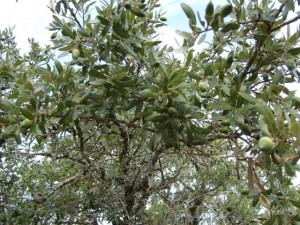It is fall in Central Texas which means mesquite bean and acorn season. I got a call from my neighbor a few days ago and her donkey with insulin resistance was walking stiff. My friend was confused because even though we had had some rain, the grass had not had time to grow so she did not think that was a problem. She was sure nothing had changed in Carol’s diet to trigger her sore feet.
Well, a little detective work solved the mystery. My neighbor went out and checked her oak trees and sure enough they were loaded with acorns. We have been in a drought condition for so long and the trees have not produced many acorns but with the rain they went crazy and the wind from a few thunderstorms brought down a large amount of acorns all at once.
Interesting that at first we saw few acorns on the ground and we never saw the donkeys actually eating any but it follows that if they are on the trees but not on the ground they are probably finding their way into the bellies of the animals. Ditto for mesquite beans which I am seeing more of as well. Talk about complicating a horse feeding program.
For a normal horse that does not need to be on a diet, adjusting your feeding program to account for extra nutrition in the pasture is as simple a cutting back what you are giving. Moderate amounts of mesquite beans and most varieties of acorns are not toxic but overeating can cause colic or laminitis. Cutting any grain portion and putting out extra hay may keep your horse full enough that he won’t overeat.
Not all horses are that impressed with acorns or mesquite beans and I find the most problems with gorging are in horses that are not getting all their nutritional needs met with their regular diet. These same horses will also overeat free choice minerals. I keep my horses on packets of bluegreen algae, probiotics and enzymes or powdered algae/probiotic blend to cover their micro-nutrient needs and I don’t see them eating many acorns. I can also put out tubs of free choice minerals and they eat them very slowly. Like chewing tree bark, gorging on acorns may be sign you need to re evaluate your horse feeding program.
For a horse on a diet you will have to be more aggressive in adjusting your horse feeding plan. Pulling your horse completely off pasture can be one solution but this can involve several months to wait for all acorns or beans to be removed or for them to rot to the point horses won’t eat them. You can fence off trees in your pasture with hot wires or put on grazing muzzles which do prevent the eating of both acorns and mesquite beans.
Another possibility is goats. My goats are vacuuming up the acorns at a rapid rate. While this won’t be a solution for the dieting horse it may shorten the time your horse has to be off pasture and provide competition for your horse on who gets the most.
So if your horse seems a bit tubby lately even though you have not changed your feeding or exercise program consider he may be cheating on what he is actually eating. Madalyn

horse candy